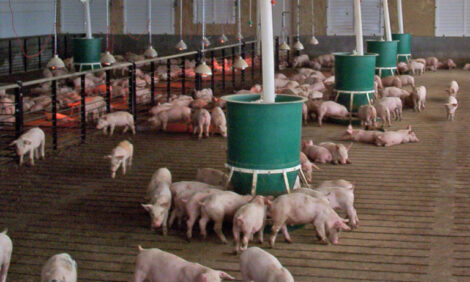



Snapshot of MBM Regulations from various Jurisdictions
Ontario Pork Newsletter - The world's first case of Bovine Spongiform Encephalopathy (BSE) was diagnosed in Britain in 1986 by Britain's Central Veterinary Laboratory. The exact cause of BSE continues to be debated, but it is known that it is associated with the presence of prions in animal feed.
These prions are believed to survive the feed-making process because the heat and pressure does not reach levels high enough to destroy infectivity. In order to prevent establishment or spread of this brain-wasting disease in cattle populations and the food chain, a number of countries have established bans prohibiting ruminant proteins in feed intended for ruminants, and some have enacted bans of all animal proteins in animal feed.
As part of the MBM Research Study commissioned by Ontario Pork to understand the context for the ban on meat and bone meal in Ontario hog rations, regulations in jurisdictions throughout the world are being examined. A preliminary literature review gives the following insights into regulations governing livestock feed in other countries around the world. Final results of the MBM study are expected in February 2004.
Canada
- The Canadian Food Inspection Agency (CFIA), under the federal Feeds Act, verifies that the livestock feeds in Canada are manufactured, sold, or imported into Canada are safe for livestock consumption and in turn the food chain. In 1997 Part XIV of the Health of Animals Regulations (see Appendix 1) was enacted that banned the use of rendered protein products derived from almost all mammals in ruminant feeds.
- Feeds that contain prohibited materials are required to be labeled “DO NOT FEED TO CATTLE, SHEEP, DEER, OR OTHER RUMINANTS”.
- Canada also does not import ruminant-derived MBM for the purpose of livestock feeding from any country that is not recognized as free of BSE.
USA
- The United States has never found a case of BSE in its cattle population. However, the Food and Drug Administration and the Department of Health and Human Services have enacted a number of strategies to prevent the disease from establishing and spreading in the country
- In August 1997, the FDA enacted the "Animal Feed Rule": Title 21 Part 589.2000 of the Code of Federal Regulations, to help enhance BSE prevention. Under this Rule, the definition of protein derived from mammalian tissues means any protein-containing portion of mammalian animals.
United Kingdom
- The first ever case of BSE was discovered in Britain in 1986. Shortly thereafter, in 1988 feeding ruminant proteins to ruminants was prohibited.
- In 1994 this ban was expanded to include feeding ruminants with all forms of mammalian protein (with specific exceptions).
- In April 1996 the ban was again expanded and prohibited feeding any farmed livestock, including farmed fish and horses, mammalian MBM.
- Currently, the ban on the use of fishmeal in ruminant feed is being investigated, as well as the ban on avian and porcine proteins in non-ruminant feed.
European Union
- Cases of BSE have been found in a number of EU countries since the late 1980s.
- Since the diagnosis of case within the EU, most member countries instituted feeding bans of varying degrees.
- As of January 2001, all EU countries have banned the use of animal feed containing any animal products (Agriculture and Agrifood Canada).
Australia
- In 1996 the recommendations of the World Health Organization were implemented. A voluntary ban on feeding ruminants feed containing ruminant materials was instituted (Meat and Livestock Australia, 2002).
- In 1997 this ban was made compulsory. In 1999 this ban was expanded to include Specified Mammalian Materials (SMM) fed to ruminants (Meat and Livestock Australia, 2002). SMM did not include blood meal and materials from horses, pigs, and in some states kangaroos.
- In March 2001 this ban was further expanded to include all meal from mammals, with no exceptions (Meat and Livestock Australia, 2002). The ban covers meals derived from fish and poultry, and blood meal. This ban was to be completely in effect by February 2002
New Zealand
- The majority of cattle are grass-fed and pasture-based in New Zealand, therefore there is an extremely low chance that BSE would enter the cattle industry because these cattle are not fed formulated rations that would include animal by-products.
- However, a voluntary ban was introduced that prohibited feeding ruminants' ruminant-derived proteins (except milk for calves). On June 1, 2000 this ban became compulsory under the
- Biosecurity Regulations 1999 (NZMAF, 2002). The spreading of meat and bone meal as fertilizer was also banned at that time. These regulations are currently being reviewed and discussions to expand them have been on-going (since September 2002).
Japan
- In 1996, the Ministry of Agriculture, Forestry and Fisheries (MAFF) prohibited the use of MBM and similar products for feed, fertilizer, and other purposes to protect against BSE (Yoshida, K. 2002).
- In September 2001, the first Asian case of BSE was found in Japan. Following the confirmation, MAFF prohibited the import of MBM from the European Union. In October, 2001, MAFF banned the use, sale and manufacture of all livestock feeds containing MBM through the Safety Assurance and Quality Improvement of Feed Law (Yoshida, K. 2002).









